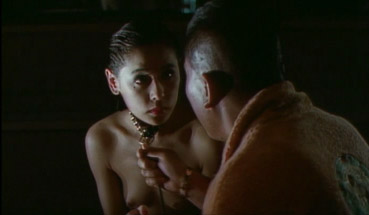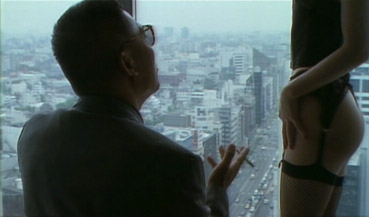|
If
you've ever thought that being a film actor seems like rather
a fun way to make a living, a viewing of Tokyo Decadence [Topâzu] will soon put you right.
I'll admit that I occasionally found myself pulled out of
the story because I kept thinking about what actress
Nikaido Miho (now married to American indie director Hal Hartley)
was going through, and what she seemed prepared to do for her art.
That little revelation, coupled with a title (well, the English
title anyway) that is in no way ambiguous about the film's
content, should serve as your first warning.
Nikaido
plays Ai, a prostitute who works for a female-run agency
in Tōkyō. Jobs appear to be assigned to the girls partly
on the basis of who is available when the calls come in, but you get the impression
that the reason Ai lands some of the more unpleasant clients
has less to do with any chosen area of specialisation than
her meekly submissive nature. The opening scene, for example,
has an almost naked Ai tied to a gynaecological chair, blindfolded,
gaged, and then injected with an unspecified substance in
her inner thigh. She puts up a brief struggle, but a warning
about breaking needles soon prompts her to just lie there
and take it. If you don't catch the line about S&M, then
you'd easily assume that she was being tortured.

Ai
is not happy in her work and the early scenes show all too
clearly why. Her clients are Japanese males of the old school,
salarymen and yakuza (it's sometimes hard to tell one from
the other) who derive sexual pleasure from her suffering
and humiliation. This is particularly evident in her second
client, who greases her hair flat ("Now I understand
why the Nazis cut off women's hair" he tells her),
slaps her buttocks, and shoves his hand between her legs,
then has her perform a slow striptease in front of the full-length
window of his tower block apartment, repeatedly ordering
her to start again when she doesn't do it exactly as he
wants. As night falls and she reaches a state of near exhaustion,
it becomes clear that this has gone on for hours. And it's
not over yet, not by a long shot.
Increasingly
there is the suggestion that Ai has chosen this lifestyle
not for desperate financial gain but as a form of self-punishment,
an externalisation of the emotional pain she suffers because
the man she loves – now a well known TV star – has married someone else. Hope is a somewhat abstract concept
for her, symbolised by a Topaz ring she buys on the advice
of a fortune teller. It's a possession whose symbolic significance
is emphasised by the original Japanese title, but whose key
narrative function is to cause Ai distress when she loses
it, and to give her and us an almost Faustian glimpse of
the darkest side of her trade when she attempts to retrieve
it.
With its minimalist approach to story, Tokyo Decadence
is more a portrait of a lifestyle, and even then only one
particular aspect of it. As Ai travels from one client to
the next to unwillingly engage in a range of sexual acts
that many will instantly categorise as perverse, the response
of the viewer is likely to depend in part on their own opinion about what separates depravity from erotica, and I am fully
aware of what even making that statement might say about
mine. Certainly I found myself oddly curious about what
Ai might encounter next, and in the sometimes peculiar position
of being disturbed and intrigued by the very same imagery.
Whether
Ai is new to this life or an old hand is uncertain, but
increasingly there is the sense that her time to break free
is overdue, seen in her terrified reaction to the uncertain
horrors being inflicted on the girl in an apartment she
returns to, in her refusal to play the part of a dead girl
in one client's necrophilia fantasy, and in her temporary
friendship with dominatrix Saki, whose seeming enthusiasm
for the job appears to stem largely from a chemical intake
that would floor an elephant. It's Saki and specifically
a drug she gives Ai that both prompts and sabotages Ai's
final, semi-surreal trip to find closure on her past relationship.
Despite the humiliation she suffers on a daily basis at
work, she is still ill-prepared for what the outside world
can dish out.

Whether
Tokyo Decadence is sleazy and monotonous
exploitation or a bold and disturbing journey into the darker
side of human sexual desire will be for the individual viewer
to decide, and despite some initial uncertainty, I'm going
with the latter. It's not a comfortable ride, nor should
it be, but increasingly there is a genuine sense of purpose
to director Murakami Ryû's unflinching and ultimately
sobering approach. If you're easily offended or believe
that sex is a lovely and pure thing that should only be
shown as a physical expression of the love between two partners,
then good luck to you, but do yourself a big favour and
give this film a miss. For those of us who believe that
to truly understand what makes us good means also exploring
our dark side, then Tokyo Decadence is
a film that will take your hand and help you peer into the
abyss.
It
should be noted that this is the 112 minute cut of the film
repared for the US market to avoid an X rating, not the
135 minute Japanese original. Full details of the cut material
can be found on the IMDb page here.
At
it's best, usually in daylight exteriors or night scenes
with high contrast lighting, the picture quality doesn't
look too bad, with reasonable colour and detail, and the
black levels are almost always strong. But this is a film
that takes place mostly at night and in sometimes dimly
lit rooms, and here the news is not good. This is a non-anamorphic
NTSC to PAL transfer that looks very much as if it's been
sourced from tape (the sort of blip you only get on analogue
video tape appears briefly in one later sequence). Darker
scenes have poor shadow detail and there are some seriously
visible compression artefacts that occasionally break up
into the sort of banding you'll find on internet MPEG files.
The
Dolby 2.0 stereo track is adequate but there's little to
judge it by, with dialogue sometimes minimal and sparse
use made of Ryuchi Sakamoto's score.
None.
Risky
cinema of this sort is always going to walk a thin line
between art and exploitation, but it's a balancing act that
Tokyo Decadence, in my humble opinion,
just about pulls off. Not much of an advert for Tōkyō's
sex industries, it would come cautiously recommended were
it not for the DVD, whose lack of extras and below par transfer
do not justify the asking price.
|